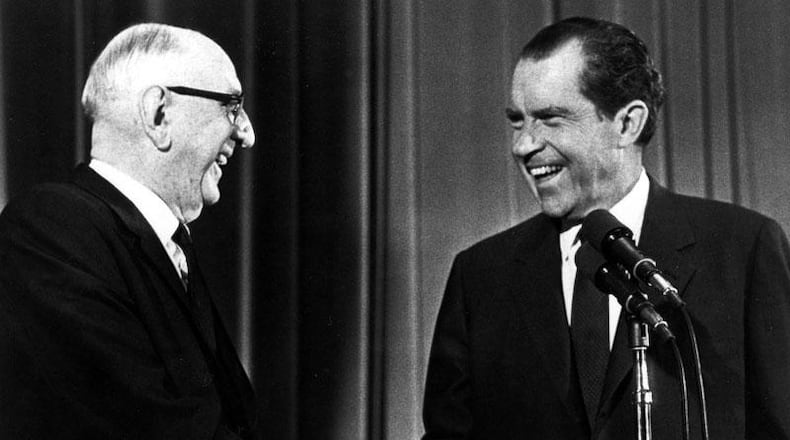The Russell Senate Office Building in Washington is named for the late Georgia senator Richard B. Russell Jr., at least for now.
Russell, a native of Winder, Ga., served in the U.S. Senate for almost 40 years, from 1933 until his death in 1971. An adviser to presidents who once ran for president himself (in 1952), Russell was considered one of the most influential senators of his time. He was speaker of the Georgia House of Representatives and governor before his election to the U.S. Senate in 1932.
The U.S. Senate building, the oldest of several such Senate office buildings in DC, was named for Russell the year after he died. But the building could be renamed for U.S. Sen. John McCain, who died Saturday. Senate Minority Leader Chuck Schumer said this weekend that he would introduce a resolution to rename the building in memory of McCain.
Who is Richard B. Russell Jr.?
Richard Brevard Russell Jr. is perhaps best known as a supporter of U.S. military and defense and an influential opponent of federal civil rights legislation, according to the New Georgia Encyclopdia and other biographies of Russell. His role as chairman of the Armed Services Committee and membership in other key committees made him a key decision-maker on military policy legislation and spending.
On civil rights, he was a leader of Southern senators who opposed civil rights legislation, including the Civil Rights Act of 1964, according to a U.S. Senate biography. He supported segregation on the basis of "states' rights" and used his parliamentary skills to block civil rights legislation. Russell was co-author of the 1956 Southern Manifesto that criticized the Supreme Court's landmark Brown desegregation case as an abuse of judicial power.
Richard Russell was born in Winder on Nov. 2, 1897. He died at Walter Reed Hospital in Washington, D.C., on Jan. 21, 1971.
The U.S. Senate voted in 1972 to name the Senate Office Building for Russell.
Russell was one of the youngest U.S. senators at the time of his election. When he died, he was among the oldest, at age 73. His time in the Senate spanned from Franklin Roosevelt’s New Deal to the Vietnam War.
Senator John Stennis of Mississippi, who delivered the main eulogy at Russell’s funeral, said in his address, “I believe he had the most thorough grasp of more of our major problems in government than any man I have ever known.”
Then-President Richard Nixon and former President Lyndon Johnson expressed deep admiration for Russell, with Nixon calling him a giant.
"A quarter of a century ago, when I first came to the Congress of the United States," Nixon said, "Richard Russell of Georgia was already a name that inspired a universal admiration and respect, from legislative adversaries and allies alike. He possessed in unprecedented abundance a rare blend of courage, character, vision, and ability that moved him indisputably into the ranks of those giants who have served in the United States Senate."
Russell's body lay in state in the Georgia Capitol rotunda for 24 hours before his funeral near his home in Winder, a city in northeast Georgia between Lawrenceville and Athens. An historic marker stands near the Russell family home outside of Winder.
President Nixon traveled to Atlanta to place at wreath by his casket but did not attend the funeral. Vice President Spiro Agnew led a delegation representing the administration, but bad weather diverted their plane to Charleston, S.C., where brief remarks by Agnew and others and the longer eulogy by Stennis were carried to the Georgia funeral via a remote television connection, according to articles in the AJC archives.
Traveling with Agnew were Senate Majority Leader Mike Mansfield, Sen. Herman Talmadge of Georgia and U.S. Rep. Phil Landrum of Georgia.
Among the dignitaries at the funeral were Secretary of State William Rogers, Defense Secretary Melvin Laird, Postmaster General Winton Blount and former Secretary of State Dean Rusk.
Former Vice President Hubert Humphrey and former Congressman Carl Vinson of Georgia, then 86, also attended. Also present was Gen. William C. Westmoreland, who was an American commander in Vietnam, and Admiral Thomas Moorer, chairman of the Joint Chiefs of Staff.
Then-Gov. Jimmy Carter delivered a brief eulogy.
The Russell Senate Office Building is not the only facility named for Russell. His name was also placed on on a Sturgeon-class nuclear submarine (decommissioned in 1994), the Russell lake and dam in Elberton, Ga. and a federal court building in downtown Atlanta, among others.
Russell is credited with helping to establish the Centers for Disease Control and Prevention headquarters in Atlanta, according to the New Georgia Encyclopedia. Originally called the Communicable Disease Center, it opened in the 1940s in a small building in downtown Atlanta, according the CDC site. He also championed passage of the National School Lunch program in 1946.
Russell used his Senate seat to bring other Georgia facilities supported by federal funds. These include some that carry his name, such as the Russell Agricultural Research Center in Athens, known now as the USDA Richard B. Russell Research Center.
Russell's father, Richard B. Russell Sr., was chief justice of the Georgia Supreme Court. His mother, Ina Dillard Russell, was a teacher. A library at Georgia State College and University in Milledgeville is named for her.
Russell was the uncle of Betty Russell Vandiver, wife of Georgia Gov. Ernest Vandiver (in office 1959-1963).
RELATED: Richard B. Russell papers at the University of Georgia
About the Author
Keep Reading
The Latest
Featured


